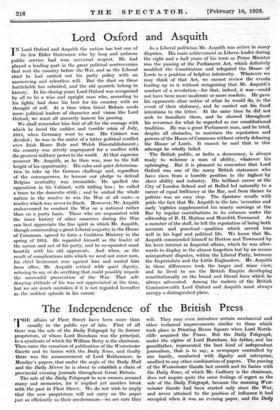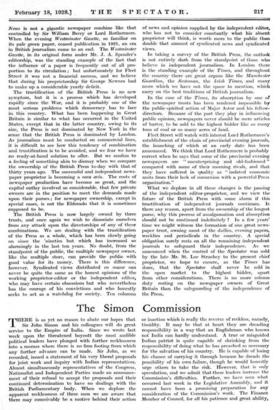The Independence of the British Press T HE affairs of Fleet
Street have been more than usually in the public eye of late. First of all there was the sale of the Daily Telegraph by its former proprietors, of whom Lord Burnham was the principal, to a syndicate of which Sir William Berry is the chairman.
• Then came the cessation of publication of the Westminster Gazette and its fusion with the Daily News, and finally there was the announcement of Lord Rothermere, in Monday's papers, that under the aegis of the Daily Mail and the Daily Mirror he is about to establish a chain of provincial evening journals throughout Great Britain. The sale of the Daily Telegraph to new owners aroused many sad memories, for it implied yet another break with the past in Fleet Street. We do not wish to imply that the new proprietors will not carry on the paper just as efficiently as their predecessors--we are sure they will. They may even introduce certain mechanical and other technical improvements similar to those which took place in Printing House Square when Lord North- cliffe acquired the Times. But the Daily Telegraph; under the regime of Lord Burnham, his father, and his grandfather, represented the best kind of independent journalism, that is to say, a newspaper controlled by one family, conducted with dignity and enterprise; nnallied to any other combination of papers. The passing of the Westminster Gazette last month and its fusion with the Daily News, of which Mr. Cadbury is the chairman, does not inspire quite the same feelings of regret as the sale of the Daily Telegraph, because the morning West- minster Gazette had been started only since the War, and never attained to the position of influence it had occupied when it was an evening paper, and the Daily News is not a gigantic newspaper combine like that controlled by Sir William Berry or Lord Rothermere. When the evening Westminster Gazelle, so familiar on its pale green paper, ceased publication in 1921, an era in British journalism came to an end. The Westminster Gazelle, in its original form under Mr. J. A. Spender's editorship, was the standing example of the fact that the influence of a paper is frequently out of all pro- portion to its circulation ; but unfortunately for Fleet Street it was not a financial success, and we believe that during his proprietorship Sir George Newnes had to make up a considerable yearly deficit.
The trustification of the British Press is no new symptom, but it is a process which has developed rapidly since the War, and it is probably one of the most serious problems which democracy has to face in, this country. What has been happening in Great Britain is similar to what has occurred in the United States, except that in the latter country, owing to its size, the Press is not dominated by New York in the sense that the British Press is dominated by London. As journalism must be conducted on commercial lines, it is difficult to see how this tendency of combination and thistification is to be avoided, and we fear we have no ready-at-hand solution to offer. But we confess to a feeling of something akin to dismay when we compare the ownership of the British Press to-day with that of thirty years ago. The successful and independent news- paper proprietor is becoming a rara avis. The costs of newspaper production have become so great, and the capital outlay involved so considerable, that few private owners are in the position to meet the demands made upon their purses ; for newspaper ownership, except in special cases, is not the Eldorado that it is sometimes supposed to be.
The British Press is now largely owned by three trusts, and once again we wish to dissociate ourselves from any attack upon the directorships of any of these combinations. We are dealing with the trustification of the Press as a whole, which has been slowly going on since the 'nineties but which has increased so alarmingly in the last ten years. No doubt, from the standpoint of the public, the multiple newspaper owner, like the multiple store, can provide the public with good value for its money. There is this difference, however. Syndicated views distributed en masse can never be quite the same as the honest opinions of the working proprietor-editor or the independent editor, who may have certain obsessions but who nevertheless has the courage of his convictions and who honestly seeks to act as a watchdog for society. Ten columns of news and opinion supplied by the independent editor, who has not to consider constantly what his absent proprietor will think, is worth more to the public than double that amount of syndicated news and syndicated views.
In taking a survey of the British Press, the outlook is not entirely dark from the standpoint of those who believe in independent journalism. In London there is the standing example of the Times, and throughout the country there are great organs like the Manchester Guardian, the Scotsman, the Irish Times, and many more which we have not the space to mention, which carry on the best traditions of British journalism.
In the case of the Times, its absorption by one of the newspaper trusts has been rendered impossible by the public-spirited action of Major Astor and his fellow- directors. Because of the part they play in influencing public opinion, newspapers never should be mere articles of barter, to be sold to the highest bidder like so many tons of coal or so many acres of land.
Fleet Street will watch with interest Lord Rothermere's establishment of the chain of provincial evening journals, the launching of which at an early date has been announced. We think that Lord Rothermere is probably correct when he says that some of the provincial evening newspapers are " unenterprising and old-fashioned " compared with some of their morning rivals, and that they have suffered in quality as " isolated economic units from their lack of connexion with a powerful Press organization."
What we deplore in all these changes is the passing of the independent editor-proprietor, and we view the future of the British Press with some alarm if this trustification of independent journals continues. Is there any reason, apart from the ownership of the longest purse, why this process of amalgamation and absorption should not be continued indefinitely ? In a few years' time we might witness the formation of one great news- paper trust, owning most of the dailies, evening papers, weeklies and periodicals in the country. A special obligation surely rests on all the remaining independent journals to safeguard their independence. As we announced when the control of the Spectator was sold by the late Mr. St. Loe Strachey to the present chief proprietor, we hope to ensure, as the Times has done, that the Spectator shall never be sold in the open market to the highest bidder, apart from other considerations. There is no more solemn duty resting on the newspaper owners of Great Britain than the safeguarding of the independence of the Press.







































 Previous page
Previous page